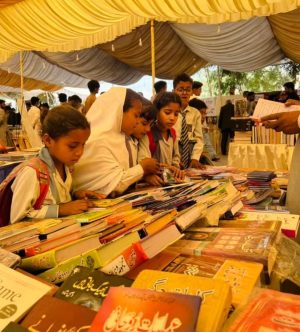Last week, Pakistan’s port city of Gwadar, which is best known as the gateway of the China-Pakistan Economic Corridor, was transformed into a book lover’s paradise. It hosted the Gwadar Book Festival, organized by a local organization, the Rural Community Development Council.
The vibrant festival draw hundreds of writers, activists, environmentalists, academics, and community leaders from different parts of Pakistan. Over $10,000 worth of books were sold at the event — a remarkable feat for a small town like Gwadar, which has a population of under 100,000.
The theme of the festival was climate change, its challenges, and how it can be tackled. While a range of topics were discussed at the festival sessions, it was climate change that resonated the most with the local community, given Gwadar’s unique environmental vulnerabilities. The theme highlighted the urgent need to address the city’s exposure to climate-related risks and the need to find sustainable solutions for its future.
Perched on the edge of the Arabian Sea, Gwadar is a town of stark contrasts. Once a quiet fishing hub, it has gradually evolved into a critical node of economic activity under CPEC. However, this newfound prominence, while masking the growing environmental vulnerabilities the city today faces, also highlights the urgent need for sustainable development and climate resilience.
For example, recently the government of Pakistan announced the completion of a feasibility study for a water supply project that aims to provide water to Gwadar from Tajikistan to address water shortages. While the full details of this ambitious project’s execution are unclear, it emphasizes the urgent need for reliable water resources as Gwadar continues to expand under CPEC’s influence.
It is Gwadar’s location just 400 kilometers from the Strait of Hormuz, a critical maritime choke point, that has made it an attractive site for foreign investment in a deep-sea port. But the same geography makes the town highly vulnerable to the cascading impacts of climate-related risks. These risks include rising sea levels, groundwater intrusion, torrential rains and recurrent urban flooding. Between the end of February and early March 2024, Gwadar received 180 millimeters of rainfall in a 30-hour-long heavy downpour that resulted in flash floods. A similar situation unfolded in Gwadar in 2022, when one-third of Pakistan was submerged in devastating floods.
Pakistan today ranks among the top 10 countries most affected by climate change, as highlighted by the Global Climate Risk Index. Despite contributing less than 1 percent of global carbon emissions, Pakistan faces severe consequences of climate change, including rising sea levels, rising temperatures, and increased variability in rainfall patterns.
A key issue discussed in one of the panels at the Gwadar Book Festival was how the town faces seawater intrusion. As a low-lying coastal area surrounded by the Arabian Sea on three sides, the city has seen its natural groundwater flow disrupted due to rising sea levels and excessive freshwater extraction.
A research study by coastal hydrogeologist and environmental consultant Pazeer Ahmad, one of the panelists in a session on climate change impacts at the book festival, drew attention to how the disruption of natural groundwater flow has led to seawater infiltrating freshwater aquifers, leaving much of the city’s underground reserves contaminated with saline water. As a result, while older infrastructure has become increasingly vulnerable, new construction is nearly impossible in many areas due to the pervasive presence of seawater just beneath the surface.
These extreme climate change impacts and weather events, and a lack of effective and adequate urban planning and climate adaptation measures, have positioned Gwadar at the forefront of the region’s broader fight against climate vulnerability.
While the need to mitigate and adapt to the impacts of climate change is urgent, raising awareness and understanding among both the community and the stakeholders is just as important. Although Gwadar’s residents already experience the consequences of drinking water shortages, rising sea levels, urban flooding, and shifting weather patterns, the root causes and potential solutions remain largely unexplored.
This gap makes festivals and discussions with climate change themes more important to ignite conversations, empower local populations to become active participants in building resilience against climate threats, and encourage the government to implement effective climate adaptation policies, invest in sustainable infrastructure, and most importantly engage with communities in creating localized solutions.
The panel on environmental challenges – which featured hydrogeologist Ahmed, environmentalist and Deputy Director of Gwadar Development Authority Abdul Raheem, Vice Chair of the Municipal Committee Gwadar Majid Johar, and Yunus Anwar, a representative of the Mahigir Itehad, a local fishermen rights organization – discussed the need for more research, climate-resilient infrastructure, and integrated water and waste management systems. They also shed light on how climate change is directly impacting local communities in Gwadar, particularly in terms of livelihood and the fishing industry, where illegal trawling is a major concern affecting ocean biodiversity.
However, organizing such book festivals and indeed any large gatherings in Balochistan in recent years has not been without challenges. Just two weeks before the Gwadar Book Festival, police in Gwadar raided a book stall set up as part of a book caravan organized by Baloch students, confiscating numerous books and reportedly detaining several students. While the police cited concerns over the content of the books, there was widespread condemnation from various groups who viewed the action as an infringement on intellectual and cultural expression.
Despite these challenges, the Gwadar Book Festival stands as a testament to the resilience of the local community and the growing involvement of intellectuals and literary figures from across the country in the problems of a town in a strife-torn region. By initiating dialogue on pressing issues like climate change, the festival served as a catalyst for collective action toward building a resilient future for Gwadar.

































